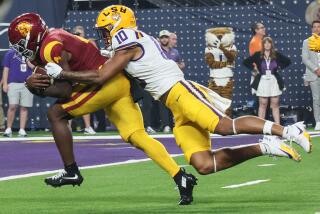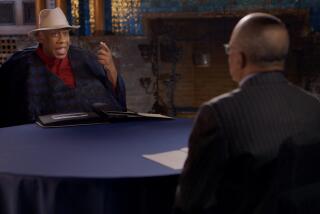No O.C. Outlets for Live King Trial
When the landmark Rodney King beating trial opens next week in Simi Valley, the 8-month-old Court TV channel will offer viewers a live, gavel-to-gavel, ringside seat.
But Orange County--and most of Los Angeles--apparently will have to be satisfied with nightly newscast wrap-ups or CNN’s on-again, off-again live coverage.
Of several Orange County cable television systems contacted Tuesday, none reported plans to carry live coverage of the trial. Only a few cable systems in Southern California carry Court TV. “It’s no secret that Los Angeles is the one major city that doesn’t get us,” said Court TV founder and president Steve Brill.
Since last July, Court TV has offered full coverage of such sensational trials as Milwaukee serial killer Jeffrey Dahmer’s and the William Kennedy Smith and Mike Tyson rape cases. Most major urban areas now have a cable channel devoted to Court TV, including Boston, Washington, New York, Atlanta and Denver.
But the only cable systems in Southern California that carry Court TV are in San Diego, Rancho Cucamonga, Canyon Country, South Pasadena and the Mojave Desert community of Ridgecrest.
Cathy Morales of Century Cable of Southern California, which serves Brea and La Habra, said limited channel capacity has kept Court TV out of the area. Morales noted that the situation may change when the cable system completes a planned upgrade, which would increase the capacity. However, she added, so far there have not been many subscriber requests for Court TV.
Elected officials have little real power to force cable companies to carry the channel, said Susan Herman, manager of the Los Angeles department of telecommunications. Since Congress deregulated the cable industry eight years ago, a city council can take drastic action, such as revoking or refusing renewal of a cable license, but raising rates or failing to carry a particular cable channel would probably not constitute grounds for revocation, she said.
Like any other profit-making enterprise, cable companies respond to the desires of paying subscribers, she said.
“That’s why the slogan ‘I want my MTV’ began,” she said. “Obviously, cable companies have other things they might want to put on, so Court TV probably should do what MTV did: Get people to let their cable company know they want their Court TV.”
Some cable operators say they are trying to make arrangements to carry the coverage of the Rodney King trial, in which four Los Angeles police officers are accused of assault with a deadly weapon and excessive force in connection with the videotaped beating of King last March.
“I believe that the Rodney King beating has had a significant impact on the politics of Los Angeles County and, as a public service to our viewers, we’re going to try to give them every opportunity to see what is happening in that courtroom,” said Bill Rosendahl, vice president of operations for Century Southwest Cable, which serves more than 170,000 subscribers in West Los Angeles. Whether Century carries the trial on its own, by participating in the pool coverage, or by striking a deal with Court TV remains to be seen, he said.
A cable system’s cost to carry Court TV is about 11 cents per subscriber per month, with discounts for larger cable operators, according to Brill, who hopes to parlay the five- to six-week King trial into long-term contracts with Los Angeles cable systems.
The King trial “should help us get the attention of cable operators,” Brill said. “On the other hand, we have tried very hard not to be perceived as exploiting any particular case for our personal gain. We don’t want to own the trial. We don’t want to sell the trial.”
Brill says that his company will be devoting most of its air time and the efforts of about a dozen staff and free-lance crew members to the trial. As in December’s William Kennedy Smith trial in Florida, Court TV will be responsible for the pool coverage inside the courtroom. Two more pool cameras are located in the hallway to show witnesses arriving, and in an adjoining courtroom that has been converted to an interview room.
The other broadcast journalists who will descend upon Superior Court Judge Stanley M. Weisberg’s courtroom in the new Simi Valley courthouse are already wrestling with how much of the extensive daily trial footage to use.
Very little, they say, is likely to air live.
“Once you’ve seen the George Holliday tape, how can you match that from the standpoint of drama?” asked KCBS-TV Channel 2 legal reporter Harvey Levin. “The most dramatic piece of evidence in the case is something that people have seen over and over.”
Officer Timothy E. Wind, 31, Officer Theodore J. Briseno, 39, Sgt. Stacey C. Koon, 41, and Officer Laurence M. Powell, 29, are charged with the March 3, 1991, beating of King. The beating was videotaped by Holliday, an onlooker, and it spurred a national outcry against police brutality.
KNBC-TV Channel 4 spokeswoman Regina Miyamoto said that it is doubtful that the station will break into regularly scheduled daytime programming unless there is dramatic live testimony. Likewise with the other two network owned-and-operated stations, KABC-TV Channel 7 and KCBS.
“Looking at the backside of a lawyer is not particularly compelling TV,” said KCBS’ Levin. “And you’re going to see a lot of that. You’ve got five lawyers (one for each defendant, and the prosecutor) and they can all make objections.”
Nonetheless, many TV outlets have signed up to get access to the pool feed, including KCOP Channel 13, KTTV Channel 11, KCAL Channel 9, KMEX Channel 34, KTLA Channel 5, KABC, KNBC, KCBS, CNN, ABC, CBS, NBC, San Francisco’s KGO-TV and E! The Entertainment Channel. KDOC Channel 56 in Anaheim will get its feed from CNN for its nightly newscast; Huntington Beach-based KOCE Channel 50 doesn’t have any locally produced regular news programming.
Tom Searson, news director for E! The Entertainment Channel, has already assigned stories on the courtroom as theater and a comparison between the importance of the famous John F. Kennedy assassination film shot by Abraham Zapruder and the Rodney King beating videotape.
“I signed up to take the Rodney King feed on a daily basis, but basically we’ll use it only when big things happen,” he said.
Before jury selection began, Judge Weisberg ordered a 14.2-second delay on live feeds, fearing that instantaneous transmission could breach attorney/client confidentiality in the event that one of the courtroom microphones picked up a private conversation.
To accommodate the order, broadcasters in the pool had to chip in $500 apiece to pay for video-delay equipment. The device had to be custom-made by Eventide, a video specialty companyin New Jersey that makes similar tape-delay mechanisms for “Saturday Night Live,” “LarryKing ive!” and the Home Shopping Network.
Times correspondent Rick VanderKnyff contributed to this report.
More to Read
The biggest entertainment stories
Get our big stories about Hollywood, film, television, music, arts, culture and more right in your inbox as soon as they publish.
You may occasionally receive promotional content from the Los Angeles Times.










